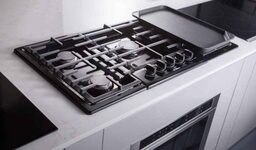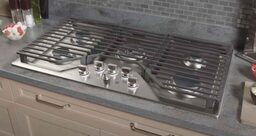
 Save Upto $850 ›
Save Upto $850 ›It can happen to anyone! Mistakes are never intentional! However, this mistake may lead to the devastation that could result in fatal injury or even death.
To get a further detailed insight into the subject query keep on reading. We have tried to answer this question in possibly the best way.

Techamor Y201 Gas Leak Detector, Portable Methane Propane Combustible Natural Gas Leak Sniffer Detector
If you live in an earthquake-prone location, such as the west coast, you have much more to think about when it comes to gas leaks. In order to cope with these difficulties, contact your utility or visit their website.

Gas stove left on without flames
Do not boil water on the stove for the sake of producing heat rather than for the purpose of cooking
Your oven and stove are not house heaters, they will never be, and you shouldn’t use them as heaters. Because it can put your life at stake and at risk of carbon monoxide poisoning, explosions, and fires, among other things.

Here are some tips and precautionary measures which can help you to avoid any calamity if you left your gas stove on accidentally!
It’s important to turn off the gas stove as quickly as possible if you left it on without a flame.
The majority of individuals will leave the gas stove on with food on top. This is typical, but if you leave it on with no food on top, there are severe safety concerns to consider.
This is why the first step should be to address the issue at its source. This entails shutting off the gas stove once the air has been cleared.
If the gas stove is still turned on, anything you attempt to solve the problem will just make it worse or remain the same.
To make things better try to ventilate your home. Open all the windows and doors in your home, particularly the ones which are nearby to your gas stove.
The window will enhance ventilation in the room and give an exit from the odor in the air.
Otherwise, the air quality will stay unchanged as it settles inside the kitchen. You must instantly open the window to allow fresh air to enter.
If a gas stove has been left on for an extended period of time, a kitchen fan should be installed.
This is also true if your kitchen does not have a window. If you don’t have access to a window, the best option is to install a fan in a room with one.
This will aid in the propagation of the odor while also ensuring that it does not leave the property once it enters the other room.
Or better yet you can:
If you use a gas stove in your house, here are some guidelines and safety precautions to help you keep as safe as possible.
Avoid using your gas stove as a source of heat to avoid carbon monoxide poisoning. Gas stoves must be vented to the outside and the vent should not be obstructed, according to the manufacturer’s instructions.
In situations where gas appliances are utilized, a smoke or carbon monoxide detector is required.
Detectors are useful, especially in situations where there are elderly persons who may have a reduced sense of smell.
They don’t seem to be able to detect gas leaks. Install the detectors outside the kitchen if you don’t want to get an alarm every time you use your stove, even if the conditions are ideal.
Make sure that no combustible things are left near gas stoves or on the burner (s). Anything that can catch fire, such as plastic, paper, kitchen towels, and so on, is considered flammable.
The risk of fire is reduced by keeping them away from the burners. Make careful to switch off the gas when you’ve finished cooking. For some stoves, the burner must be properly lined in order to light.
Before lighting, always switch on the gas and set the temperature to your liking. If your stove does not ignite right away, it might be due to a shortage of gas or clogged burner holes. You must act in accordance with the situation.
A wire brush or a toothpick can be used to clean the channels. Unblock the holes, but don’t leave anything you’re using inside. Take cautious not to break the instruments.
It is critical that your gas appliance is installed and maintained by a professional (s). This isn’t just a personal choice; it’s also a legal necessity. Gasfitters must be thoroughly qualified and licensed. Gas services and equipment that are not properly maintained are dangerous.
Having your gas appliances tested once a year is a smart idea. This is something that certain plumbing companies can perform.
Therefore, we highly advise you to get your gas stove installed from the professional to avoid any calamity.
We recommend using safety knobs on your gas stove to protect tiny children and/or the elderly with dementia or Alzheimer’s safe.
Because minute food particles can catch fire after the stove burners have cooled down, wipe the top of the stove clean after each usage.
Soak the stove burners and grates in warm soapy water at least once a week to clean them. Remove any debris from the burner’s holes using a needle.
Make sure you understand the safety instructions that came with your natural gas equipment. If you don’t have the physical manual, contact the manufacturer or conduct an Internet search.
Never pour water on a gas stove fire. Put a cover on the pot and switch off the burner if there is a little fire in it. If the fire is bigger, you can put it out using a fire extinguisher, a fire suppression blanket, a wet cloth, or a lot of salt or baking soda.

Yes. Leaving a gas burner on can quickly escalate into a hazardous situation. If the gas stove is left unattended, which happens to be the most prevalent cause of kitchen fires.
Leaving the gas oven, range, or stove alone while cooking is dangerous! When no one is home, the US Fire Administration strongly advises against leaving cooking equipment unattended.
As per US Fire Administration Department:
“The Residential building fire causes in 2019 354,400 fires (estimated), out of which 50.2% were caused by the Kitchen appliances”
Follow these steps if you find you’ve left your gas stove on when you get home.
Leaving a gas burner on can be fatal in a variety of ways:
However, NEVER leave a gas stove alone, such as overnight or while you are away from home.
If you’re not cooking, your objective should be to never leave your gas stove on. There is no such thing as a “safe number of hours.”
Carbon monoxide is released, which can make you sick or perhaps kill you. The second concern is that a pot of food left on the stove might catch fire.
If a pot is left on the burner unattended, whatever is in it may ultimately boil over or burn, perhaps resulting in a fire.
When a gas stove is turned on, it may emit anywhere from 100 to 800 parts per million of CO. Knowing this, it’s a good idea to leave a window open when using a gas oven for a long time.
In a nutshell, NEVER leave a gas burner alone.!

Natural gas is divided into two categories i.e. propane & methane, each of which dissipates differently.
Because it takes an hour or two for the gas to disperse, it’s best to avoid turning on any electric devices or lighting a fire if you’re on a property with a probable gas leak.
It’s also why you should leave the house until the first responders have cleared it.
The stench of gas might last anywhere from a few minutes and many hours. It all depends on how much gas was released and how long it was expelled.
You might assume it’s a good idea to open the windows if you’ve left your gas stove on and can smell the gas fumes, but you’re mistaken!
Do not let the windows open! Natural gas may ignite once it reaches a concentration of 5 to 15% of the air in an area. Opening a window adds oxygen to your kitchen, making it much more dangerous than it already is with the gas within.
Carbon monoxide is a very toxic gas with no odor or flavor. When you burn gasoline in automobiles or trucks, stoves, ovens, barbecues, or generators, it emits fumes. It can build up in locations that are securely sealed or shuttered. It can make you sick if you breathe it in, and poisonous quantities can kill you.
When combustion gases become trapped in a poorly ventilated or confined location, CO levels can rise to deadly levels (such as in a garage). CO builds up in your bloodstream after inhaling these gases, causing serious tissue damage. CO poisoning is exceedingly dangerous and can even be fatal.
Depending on which estimates you use, a gas oven at 350 degrees costs between 10 and 23 cents per hour.
When you switch on a burner on a gas stove, if the flame does not ignite, the stove may explode. The oven will fill with combustible gas, making it very simple for the stove to catch fire and explode.
To give natural gas a unique fragrance, most natural gas producers add a chemical called mercaptan. Look for a hissing or whistling sound. Check the top of the stove or the range. Use a gas leak detector to find out if there is a problem. Perform a Soapy Water Test.
If you leave an empty, or almost empty, nonstick pan on a hot burner for a few minutes, hazardous vapors will be in the air by the time you smell it in the next room. If you do happen to leave an empty pan over a flame, make sure to promptly ventilate the area.
So, how much electricity does an electric burner consume in one hour? At a 12 cents per kilowatt-hour (kWh) electricity tariff, a 3000-watt oven will cost you around 36 cents per hour at high heat. When it comes to electric cooktop burners, larger burners use more power.
There is a lot of moisture on the windows where the furnace is mounted. Around the furnace, sooty spots are developing. The presence of soot, smoke, fumes, or backdraft in the house as a result of the furnace. A scorching or overheating odor.
Leaving your oven unattended is not a good idea. Although the hazards associated with some types of stoves and their characteristics are modest, this does not imply that they are completely safe. The risks are genuine, especially with electric and gas stoves, because their heat sources are so severe that they represent a higher threat if left unattended.
Signs of poisoning may appear within 1-2 hours if the carbon monoxide quantity in the air is substantially greater. A high carbon monoxide concentration can kill an exposed person in as little as five minutes.
In fresh air, carboxyhemoglobin has a half-life of around 4 hours. It takes many hours to completely remove carbon monoxide from the body, which is the critical time when further harm might occur.
Yes, carbon monoxide poisoning can occur if a gas burner is left on. Carbon monoxide is produced by all gas burners. As a result, it’s always a good idea to turn on the exhaust vent while using a gas stove.
The ignition system in your furnace or water heater is similar to a pilot light. These appliances will not light if the pilot light is out or not working properly.
If the flames on your gas cooktop are yellow or orange instead of blue or bluish-green, it’s possible that carbon monoxide is being produced.
Carbon monoxide can be produced by a stove’s pilot light if the gas is not distributed properly. When a vent pipe is obstructed or limited, or when there isn’t enough air to react with the gas, this can happen.
When you sleep in a room with a traditional coal or gas fire, a log burner, a stove, or a rear burner left on overnight, you risk carbon monoxide poisoning. Because you cannot feel the early signs of carbon monoxide poisoning, it is critical that you take precautions.

Electric and gas stoves, as well as toasters, toaster ovens, and any other electrical item that might overheat can all cause fires. When using your equipment, make sure you follow the directions carefully.
Mistakes are never intentional and if you accidentally have left your gas stove on you can follow the above mentioned precautionary measures to avoid any kind of calamity.
If you think we may have missed something that you want to know about then please let us know by commenting below!